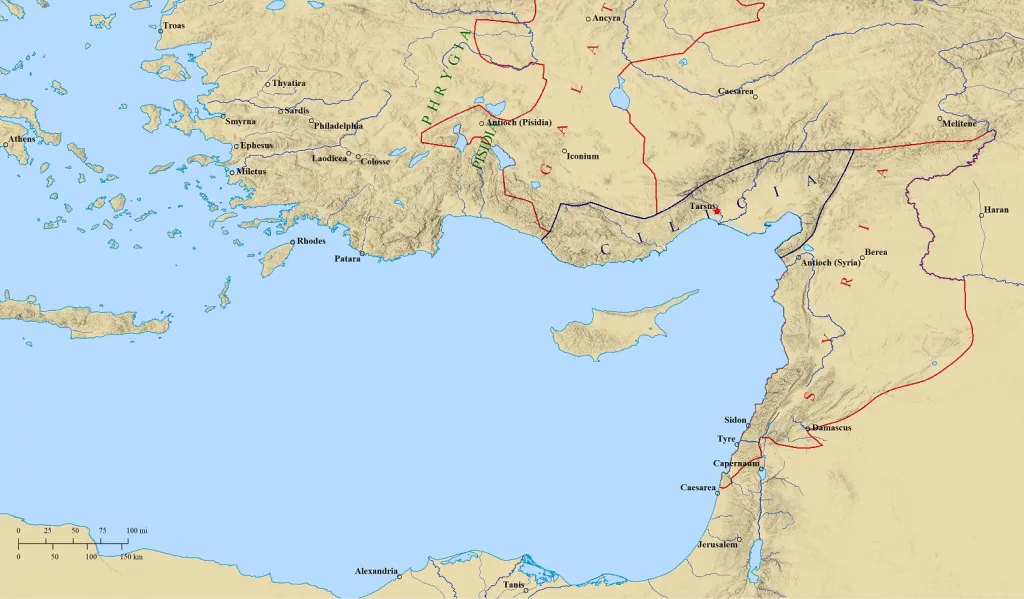Background
The apostle Paul wrote two thirds of the books of the New Testament. He was possibly the greatest apostle ever, but how much do we really know about this man? Where did he come from? What motivated him? What can we learn from his life?
Childhood
Paul was born in Tarsus of Cilicia. In this image, you see Cilicia above the northeastern part of the Mediterranean Sea.


Tarsus was a colony of Rome, so this made Paul a Roman citizen. As a Roman citizen, he had special rights that non-citizens did not have. For example, it was a common practice for a prisoner to be whipped and possibly tortured as part of their questioning. Unless a Roman citizen was accused of a capital crime, such as murder, it was considered treason to put a Roman citizen in chains or whip him. Those who committed treason were put to death, so his Roman citizenship gave him special privileges.
At some point in his childhood, he moved to Jerusalem.

Jerusalem was the capital of the nation of Israel. Even though they were subject to Rome, there was a great deal of autonomy. They were allowed to govern themselves for most things, and they could conduct business on their own.
Jerusalem was the center of all Jewish activity. It’s where the temple was located. The Jewish seat of government was located there, as well. It was also where the best Jewish scholars and tutors were. One of the most prominent scholars was Gamaliel.
Acts 5:34a (NASB)
34 But a Pharisee named Gamaliel, a teacher of the Law, respected by all the people, stood up in the Council
Education
Gamaliel was a very well-known, respected teacher. As such, probably only the best families could afford to have their sons educated by him. Paul was from one of those familes.
Acts 22:3 (NASB)
3 “I am a Jew, born in Tarsus of Cilicia, but brought up in this city, educated under Gamaliel, strictly according to the law of our fathers, being zealous for God just as you all are today.
There was an educated, Roman procurator (governor) who was impressed by Paul’s incredible learning and knowledge, though not in a good way. Paul’s training and knowledge were quite apparent to everyone around him.
Acts 26:24 (NASB)
24 While Paul was saying this in his defense, Festus said in a loud voice, “Paul, you are out of your mind! Your great learning is driving you mad.”
Zeal
Paul was raised as a privileged Jew with great zeal for his own nation. He believed strongly that the Jews were the only people chosen by God, and that everyone had to convert to Judaism. He was willing to put people in prison or even death, if they opposed his way of thinking.
Acts 22:3 (NASB)
3 “I am a Jew, born in Tarsus of Cilicia, but brought up in this city, educated under Gamaliel, strictly according to the law of our fathers, being zealous for God just as you all are today.
Stephen
After the resurrection of Jesus and the Day of Pentecost, the early church was growing very rapidly. The apostles were spending too much time trying to handle all of the daily needs of the people, though, so they decided to choose “seven men of good reputation, full of the Spirit and of wisdom” to help out with serving the people (Acts 6:3).
Acts 6:5 (NASB)
5 The statement found approval with the whole congregation; and they chose Stephen, a man full of faith and of the Holy Spirit, and Philip, Prochorus, Nicanor, Timon, Parmenas and Nicolas, a proselyte from Antioch.
These men are usually considered to be the first “deacons.” The Greek word for deacon means “servant.” Their job was to minister to the physical needs of the believers. They were more than just that, though.
Acts 6:8 (NASB)
8 And Stephen, full of grace and power, was performing great wonders and signs among the people.
Some of the Jews did not like how much the new church was growing, and Stephen was a big part of it, so they brought Stephen to the “Council.” This was part of their legal system. The Council’s decisions were final; there were no appeals. The Jews falsely accused Stephen of speaking blasphemy against “Moses and God.” Of course, they were lying, but they did manage to convince enough people to convict him and put him to death by stoning.
Acts 7:58, 8:1 (NASB)
58 When they had driven him out of the city, they began stoning him; and the witnesses laid aside their robes at the feet of a young man named Saul.
1 Saul was in hearty agreement with putting him to death. And on that day a great persecution began against the church in Jerusalem, and they were all scattered throughout the regions of Judea and Samaria, except the apostles.
This young man, Saul, was later called Paul.
Persecution
Mob mentality took hold of the Jewish people, and they were persecuting their fellow countrymen simply because they had become followers of Jesus. Saul (Paul) was one of the leaders of the persecutors.
Acts 9:1-2 (NASB)
1 Now Saul, still breathing threats and murder against the disciples of the Lord, went to the high priest,
2 and asked for letters from him to the synagogues at Damascus, so that if he found any belonging to the Way, both men and women, he might bring them bound to Jerusalem.
Saul was not doing this because he was mean. He truly believed that this was how he was supposed to serve God. Simply being dedicated or “having faith” is not enough. We need to believe and follow Jesus, the Way, the Truth, and the Life (John 14:6). Saul was going full speed in the wrong direction, but God had other plans for him.
Road to Damascus
Acts 9:3-6 (NASB)
3 As he was traveling, it happened that he was approaching Damascus, and suddenly a light from heaven flashed around him;
4 and he fell to the ground and heard a voice saying to him, “Saul, Saul, why are you persecuting Me?”
5 And he said, “Who are You, Lord?” And He said, “I am Jesus whom you are persecuting,
6 but get up and enter the city, and it will be told you what you must do.”
Jesus met Saul (Paul) while he was on his way to persecute Christians. Notice how Jesus said that Saul was persecuting Him, not His followers (see Matthew 26:31-46). After Saul got up, he was blind. Those who were with him led him by the hand to Damascus. When he got there, he didn’t eat or drink anything for three days. Then, God sent someone to help him.
Ananias
Acts 9:10-12 (NASB)
10 Now there was a disciple at Damascus named Ananias; and the Lord said to him in a vision, “Ananias.” And he said, “Here I am, Lord.”
11 And the Lord said to him, “Get up and go to the street called Straight, and inquire at the house of Judas for a man from Tarsus named Saul, for he is praying,
12 and he has seen in a vision a man named Ananias come in and lay his hands on him, so that he might regain his sight.”
God supernaturally called a Christian to lay hands on Saul, so he could receive his sight. He also showed Saul that Ananias would be coming. God could have healed Saul Himself, but He chose to use a person. He doesn’t need any of us; He chooses to use us, for His own glory, and so we can be part of His plan and His kingdom.
Although Ananias was fearful of the prospect of going to Saul, because everyone knew he was there to persecute believers, he obeyed God. Many times, God will call us to do things that make no sense to us. We just need to obey, then we will see and be part of His miraculous plan.
Acts 9:17-18 (NASB)
17 So Ananias departed and entered the house, and after laying his hands on him said, “Brother Saul, the Lord Jesus, who appeared to you on the road by which you were coming, has sent me so that you may regain your sight and be filled with the Holy Spirit.”
18 And immediately there fell from his eyes something like scales, and he regained his sight, and he got up and was baptized;
Saul is just beginning a journey that will change his life, and the lives of many others, for eternity.
To be continued…
More…
We would love to speak with you or have you worship the Lord with us. Please let us know how we can serve you.


Leave a Reply